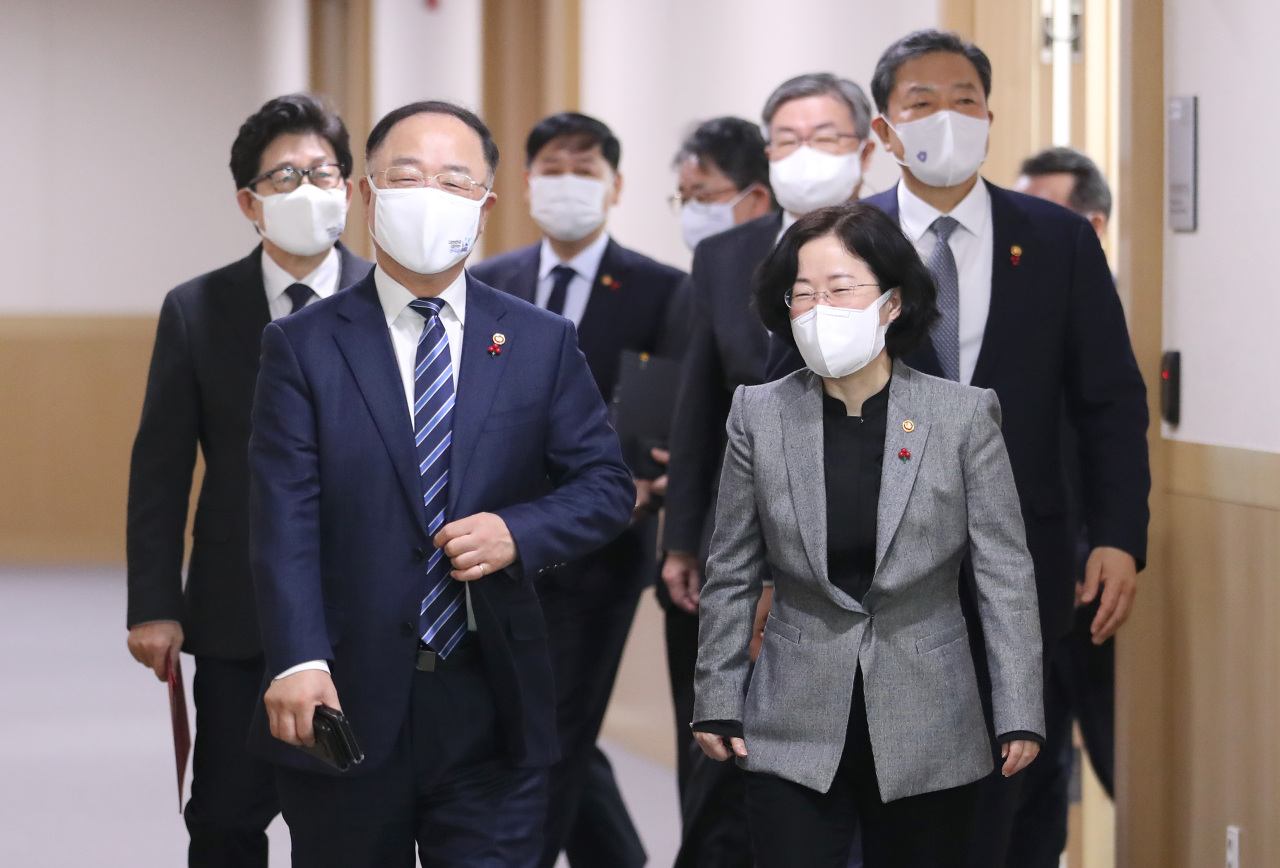Minister urges financial firms to funnel funds into new growth engines
By Park Han-naPublished : Jan. 5, 2021 - 15:18

Finance Minister Hong Nam-ki on Tuesday called for banks and other financial firms to channel more funds into sectors like green cars and biotechnology to help the virus-hit economy come back strong.
The country’s top economic policymaker underlined the importance of the financial industry’s role in helping the nation‘s economy rebound this year and moving toward becoming a pacesetting economy.
“There is abundant liquidity in the market. But inflows into future growth engine sectors that will lead the economy remain weak,” he said in a New Year’s message to the financial industry. The Ministry of Economy and Finance initially planned to deliver the message during a meeting on 2021 with heads of economic and financial institutions, but the event was called off due to concerns over the spread of COVID-19.
Hong also said that collaborative efforts should be made among government organizations and private businesses to successfully carry out the government’s key initiatives, including a 160 trillion-won ($147 billion) “New Deal” program and a nurturing plan for the “Big 3” industries, namely green cars, biohealth and non-memory chips.
“The government has been providing all-encompassing support for the New Deal plan and the Big 3 industries through aggressive liquidity injection, groundbreaking regulatory innovation and private investment incentives” he said.
“I hope that the financial industry will cooperate with the government to provide funding to more productive sectors.”
Expressing concerns over the widening disconnect between financial market performance and the real economy, the senior official pledged to carry out a thorough risk assessment and take steps to reduce the risks for stabilization of the financial sector.
“The government will carefully manage liquidity in the market, paying special attention to the possibility that liquidity, which has increased sharply in the process of responding to the (virus-led) crisis, will lead to an overflow into the asset markets and cause a surge in (household) debt,” he said.
To help cushion the blow from the COVID-19 pandemic, banks and financial companies have extended due dates on loan installments worth some 120 trillion won for small and midsize businesses so far, according to the ministry.
The government also launched a 175 trillion-won financial support package for businesses in need of an urgent cash flow boost.
The liquidity injection helped ailing companies during the coronavirus-induced downturn. But excessive cash appears to have flocked to the stock and real estate markets.
According to KB Financial Group, home sales prices rose 6.9 percent on-year as of the end of November last year.
Despite the government’s stringent real estate policies, the abundant liquidity and declining supply volume prompted a rise in housing prices in the metropolitan area, which saw a 9.2 percent increase.
Since the end of December last year, the country’s stock market continues to break its record high thanks to a retail stock frenzy.
In 2020, retail investors net purchased a record high of 47.5 trillion won in shares, up from 11.8 trillion won in 2019.
By Park Han-na (hnpark@heraldcorp.com)
The country’s top economic policymaker underlined the importance of the financial industry’s role in helping the nation‘s economy rebound this year and moving toward becoming a pacesetting economy.
“There is abundant liquidity in the market. But inflows into future growth engine sectors that will lead the economy remain weak,” he said in a New Year’s message to the financial industry. The Ministry of Economy and Finance initially planned to deliver the message during a meeting on 2021 with heads of economic and financial institutions, but the event was called off due to concerns over the spread of COVID-19.
Hong also said that collaborative efforts should be made among government organizations and private businesses to successfully carry out the government’s key initiatives, including a 160 trillion-won ($147 billion) “New Deal” program and a nurturing plan for the “Big 3” industries, namely green cars, biohealth and non-memory chips.
“The government has been providing all-encompassing support for the New Deal plan and the Big 3 industries through aggressive liquidity injection, groundbreaking regulatory innovation and private investment incentives” he said.
“I hope that the financial industry will cooperate with the government to provide funding to more productive sectors.”
Expressing concerns over the widening disconnect between financial market performance and the real economy, the senior official pledged to carry out a thorough risk assessment and take steps to reduce the risks for stabilization of the financial sector.
“The government will carefully manage liquidity in the market, paying special attention to the possibility that liquidity, which has increased sharply in the process of responding to the (virus-led) crisis, will lead to an overflow into the asset markets and cause a surge in (household) debt,” he said.
To help cushion the blow from the COVID-19 pandemic, banks and financial companies have extended due dates on loan installments worth some 120 trillion won for small and midsize businesses so far, according to the ministry.
The government also launched a 175 trillion-won financial support package for businesses in need of an urgent cash flow boost.
The liquidity injection helped ailing companies during the coronavirus-induced downturn. But excessive cash appears to have flocked to the stock and real estate markets.
According to KB Financial Group, home sales prices rose 6.9 percent on-year as of the end of November last year.
Despite the government’s stringent real estate policies, the abundant liquidity and declining supply volume prompted a rise in housing prices in the metropolitan area, which saw a 9.2 percent increase.
Since the end of December last year, the country’s stock market continues to break its record high thanks to a retail stock frenzy.
In 2020, retail investors net purchased a record high of 47.5 trillion won in shares, up from 11.8 trillion won in 2019.
By Park Han-na (hnpark@heraldcorp.com)


















![[KH Explains] Hyundai's full hybrid edge to pay off amid slow transition to pure EVs](http://res.heraldm.com/phpwas/restmb_idxmake.php?idx=652&simg=/content/image/2024/04/18/20240418050645_0.jpg&u=20240418181020)

![[Today’s K-pop] Zico drops snippet of collaboration with Jennie](http://res.heraldm.com/phpwas/restmb_idxmake.php?idx=642&simg=/content/image/2024/04/18/20240418050702_0.jpg&u=)